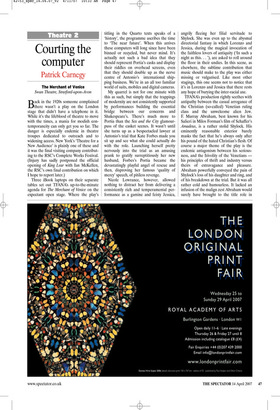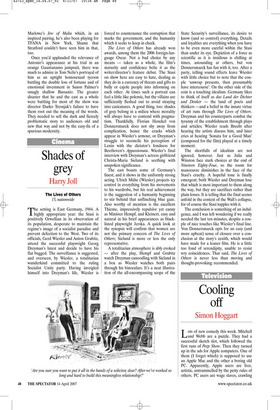Courting the computer
Patrick Carnegy The Merchant of Venice Swan Theatre, Stratford-upon-Avon Back in the 1920s someone complained there wasn’t a play on the London stage that didn’t have a telephone in it. While it’s the lifeblood of theatre to move with the times, a mania for modish contemporaneity can only get you so far. The danger is especially endemic in theatre troupes dedicated to outreach and to widening access. New York’s ‘Theatre for a New Audience’ is plainly one of these and it was the final visiting company contributing to the RSC’s Complete Works Festival. (Injury has sadly postponed the official opening of King Lear with Ian McKellen, the RSC’s own final contribution on which I hope to report later.) Three iBook laptops on their separate tables set out TFANA’s up-to-the-minute agenda for The Merchant of Venice on the expectant open stage. Where the play’s titling in the Quarto texts speaks of a ‘history’, the programme ascribes the time to ‘The near future’. When this arrives these computers will long since have been binned or recycled, but never mind. It’s actually not such a bad idea that they should represent Portia’s casks and display their riddles on overhead screens, even that they should double up as the nerve centre of Antonio’s international shipping business. We’re in an all too familiar world of suits, mobiles and digital cameras.
My quarrel is not for one minute with this as such, but simply that the trappings of modernity are not consistently supported by performances building the essential bridge between our concerns and Shakespeare’s. There’s much more to Portia than the Sex and the City glamourpuss of the casket scenes. It wasn’t until she turns up as a bespectacled lawyer at Antonio’s trial that Kate Forbes made you sit up and see what she could actually do with the role. Launching herself pretty nervously into the trial as an amusing prank to gratify surreptitiously her new husband, Forbes’s Portia became the devastatingly playful angel of rescue and then, disproving her famous ‘quality of mercy’ speech, of pitiless revenge.
Nicole Lowrance, however, allowed nothing to distract her from delivering a consistently rich and temperamental performance as a gamine and feisty Jessica, angrily fleeing her filial servitude to Shylock. She was even up to the abysmal directorial fantasy in which Lorenzo and Jessica, during the magical invocation of the faithless lovers of antiquity (‘In such a night as this... ’), are asked to roll around the floor in their undies. In this scene, as elsewhere, the sublime contribution that music should make to the play was either missing or vulgarised. Like most other stagings, this one seems not to notice that it’s in Lorenzo and Jessica that there rests any hope of burying the inter-racial axe.
TFANA’s production rightly seethes with antipathy between the casual arrogance of the Christian (so-called) Venetian ruling class and the unwelcome alien Jew. F. Murray Abraham, best known for his Salieri in Milos Forman’s film of Schaffer’s Amadeus, is a rather stolid Shylock. His eminently reasonable exterior barely masks the fact that he’s always only after his pound of the hated Christian’s flesh. Of course a major theme of the play is the endemic antagonism between his seriousness, and the frivolity of the Venetians his principles of thrift and industry versus theirs of extravagance and pleasure. Abraham powerfully conveyed the pain of Shylock’s loss of his daughter and ring, and of his breakdown at the trial. But it was all rather cold and humourless. It lacked an infusion of the malign zest Abraham would surely have brought to the title role in Marlowe’s Jew of Malta which, in an inspired pairing, he’s also been playing for TFANA in New York. Shame that Stratford couldn’t have seen him in that, too.
Once you’d applauded the relevance of Antonio’s appearance at his trial in an orange Guantanamo jumpsuit, there was much to admire in Tom Nelis’s portrayal of him as an uptight homosexual tycoon battling the double loss of fortune and of emotional investment in Saxon Palmer’s smugly shallow Bassanio. The greater disaster that he and the cast as a whole were battling for most of the show was director Darko Tresnjak’s failure to have them root out the meaning of the words. They needed to sell the dark and fiercely problematic story to audiences old and new that way and not by the easy-fix of a spurious modernity.



































































 Previous page
Previous page